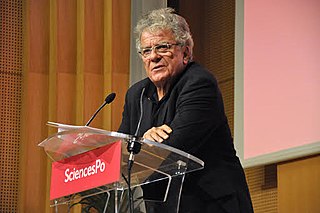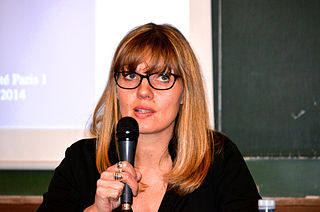Related Research Articles

Groupe Union Défense, better known as GUD, was a French far-right students' union.

Paris-Panthéon-Assas University, commonly known as Assas ([asas]) or Paris 2, is a university in Paris, often described as the top law school of France. It is considered as the direct inheritor of the Faculty of Law of Paris, the second-oldest faculty of Law in the world, founded in the 12th century.
University of Paris 1 Panthéon-Sorbonne, also known as Paris 1 or Panthéon-Sorbonne University, is a public research university located in Paris, France. It was created in 1971 from two faculties of the historic University of Paris – colloquially referred to as the Sorbonne – after the May 1968 protests, which resulted in the division of one of the world's oldest universities. Most of the law professors of the Faculty of Law and Economics of Paris preferred to perpetuate the faculty as a university, now called Paris 2 Panthéon-Assas University, but most of its professors in Economics, considered as a secondary discipline within the historical faculty of law, preferred to found the multidisciplinary Paris 1 Panthéon-Sorbonne University with professors of the faculty of humanities of Paris and a few professors of law.
Jean-Claude Colliard was a French academic and senior public servant.

The Sorbonne is a building in the Latin Quarter of Paris which from 1253 onwards housed the College of Sorbonne, part of one of the first universities in the Western world, later renamed University of Paris and commonly known as "the Sorbonne". Today, it continues to house the successor universities of the University of Paris, such as Panthéon-Sorbonne University, Sorbonne University, Sorbonne Nouvelle University and Paris City University, as well as the Chancellerie des universités de Paris. Sorbonne Université is also now the university resulting from the merger on 1 January 2018 of Paris 6 UPMC and Paris 4 Sorbonne.

The Faculty of Law of Paris, called from the late 1950s to 1970 the Faculty of Law and Economics of Paris, is the second-oldest faculty of law in the world and one of the four and eventually five faculties of the University of Paris, from the 12th century until 1970.
Marie-Anne Frison-Roche is a professor of Economic Law at the Institut d’Etudes Politiques de Paris. She is a specialist in Regulatory Law, whose doctrine she founded in France.

Olivier Duhamel is a French former university professor and politician. As a member of the social-democratic Socialist Party, he was elected as a member of the European Parliament from 1997 to 2004. In 2021 he resigned from the FNSP and his academic position after being accused of the sexual abuse of a minor. In mid-April 2021, French media, citing sources close to the investigation, reported that Duhamel had admitted to sexually abusing his stepson.

Emmanuelle Tourme-Jouannet is a professor of International law at the Sciences Po School of Law. She teaches and carries out research in International law, International dispute, Human rights and International humanitarian law as well as in History of law and Philosophy of law. Her career as a jurist and a philosopher has begun after having taken courses in law and philosophy respectively at Panthéon-Assas University and the Paris-Sorbonne University.
A Collège de droit in France is a selective training inside a faculty of law for top students selected among the French student body. Students from these programs are much more likely to enter prestigious master's degrees or law firms.
COUPERIN is an academic consortium in France. Formed in 1999, it includes more than 250 universities, research organizations, Grandes écoles (schools), COMUE, and others. The consortium negotiates with publishers the prices and conditions of access to scientific publications and other digital resources for the benefit of its members. It promotes open science, particularly with regard to scientific publications, both nationally and internationally. It is headquartered in Paris.

Fatma Chamakh-Haddad or Fatma Haddad-Chamakh was a professor, philosopher, feminist and Tunisian activist.

Paris Cité University is a public research university located in Paris, France. It was created by decree on 20 March 2019, resulting from the merger of Paris Descartes and Paris Diderot universities, established following the division of the University of Paris in 1970. It was originally established as the University of Paris, but was renamed by decree in March 2022 to its current name. The Institut de Physique du Globe de Paris was integrated as a component institution. The University headquarter is at the heart of Paris, in the 6th arrondissement at boulevard Saint-Germain. Among the best universities worldwide, in 2021 it was ranked 14th among young universities according to the Times Higher Education, and 65th according to the Shanghai Ranking.
Nicolas Warembourg is a French jurist, professor of Law at the Sorbonne.
Évelyne Pisier was a French writer and political scientist.
Frédérique Matonti is a French political scientist. She is a professor at the University of Paris 1 Pantheon-Sorbonne. She is an expert in the history of political philosophy, political parties, and gender studies.

Réjane Sénac is a French political scientist. She specialises in gender equality in recent French history and politics, as well as the politics of discrimination and diversity. She is the Director of Research at the French National Centre for Scientific Research in the Centre de recherches politiques of Sciences Po. She was president of the parity commission of the French High Council for Equality between Women and Men, which was an independent national advisory body under the Prime Minister of France from January 2013 to January 2019.

Alexandra Goujon is a French political scientist. She is a professor of political science at the University of Burgundy. She specializes in political conflict and regime change in Eastern Europe, particularly Ukraine and Belarus.
Hélène Hatzfeld is a French political scientist. She has published books on topics including social science methodology, the evolution of social work, innovations in the city of Louviers from the 1960s through the 1980s, and the political history of leftist parties and social movements in the 1970s.
References
- 1 2 "Marie-Anne Cohendet profile" (in French). University of Paris 1 Pantheon-Sorbonne. Retrieved 21 May 2020.
- 1 2 "Theses L'épreuve de la cohabitation: mars 1986–mai 1988" (in French). Theses Fr. Retrieved 21 May 2020.
- ↑ "JORF n°133" (in French). Government of France. 10 June 1992. Retrieved 21 May 2020.
- ↑ "Décrets du 10 septembre 1992 portant nomination et titularisation (enseignements supérieurs)" (in French). Government of France. 15 September 1992. Retrieved 21 May 2020.
- ↑ "Arrêté du 1er décembre 1999 portant nomination au Conseil national des universités" (in French). Government of France. 7 December 1999. Retrieved 21 May 2020.
- ↑ "Arrêté du 16 octobre 2013 portant nomination pour l'année 2013 des membres du jury du second concours national d'agrégation de l'enseignement supérieur pour le recrutement de professeurs des universités dans les disciplines juridiques, politiques, économiques et de gestion en droit public" (in French). Government of France. 3 November 2013. Retrieved 21 May 2020.
- ↑ "Groupe de travail sur l'avenir des institutions" (in French). National Assembly. Retrieved 21 May 2020.
- ↑ "Osons le Big Bang démocratique" (PDF) (in French). Nicolas Hulot Foundation.
- ↑ "Une "dose de proportionnelle" : pourquoi ? comment ? laquelle ?" (in French). Terra Nova Think Tank. 19 March 2017. Retrieved 21 May 2020.
- ↑ Rescon, Manon. "Législatives : quelle dose de proportionnelle ?". Le Monde (in French).
- ↑ "Le Référendum d'Initiative Citoyenne Délibératif" (in French). Terra Nova Think Tank. 18 February 2019. Retrieved 21 May 2020.
- ↑ Dodman, Benjamin (14 March 2019). "French state faces landmark lawsuit over climate inaction". France 24. Retrieved 21 May 2020.
- ↑ Laurentin, Emmanuel (19 September 2019). "La justice doit-elle prendre en compte le calendrier politique ?". France Culture (in French). Retrieved 21 May 2020.
- ↑ Floc'h, Benoît (16 March 2020). "Elections municipales 2020 : le probable report du second tour en raison du coronavirus promet un casse-tête juridique". Le Monde. Retrieved 21 May 2020.